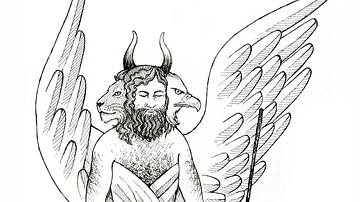Search
Did you mean: Ur?
Search Results

Definition
Hyangga
Hyangga was a form poetical 'country song,' distinct from contemporary Chinese songs, which were written in the Silla and Goryeo kingdoms of ancient Korea between the 7th and 10th century CE. The indigenous songs cover such topics as love...

Article
Origin Tales of the Penobscot Nation
The Penobscot are a Native American nation of the modern-day State of Maine, also recognized as a First Nation of Canada. Along with the Abenaki, Mi'kmaq, Passamaquoddy, and Wolastoqiyik, they form the Wabanaki Confederacy. Their origin tales...

Article
Mandan Buffalo Dance
The Mandan Buffalo Dance is a ceremonial ritual observed in the modern era to honor the spirit of the buffalo and preserve Native American cultural traditions and was performed in the past for the same reasons just prior to the buffalo-hunting...

Article
The Little Girl and the Ghost
The Little Girl and the Ghost is a legend of the Cheyenne nation concerning a young girl abducted by a spirit after she is cast out by her mother. The story explores many themes common in Cheyenne literature, including the importance of following...

Image
The Emperors of Rome, 27 BCE - 285 CE
This infographic presents the timeline of Roman emperors from Augustus to Diocletian, covering nearly three centuries of imperial rule. It traces the transformation of Rome from republic to empire, through stability, crisis, and reform, ending...

Definition
Horus
Horus is the name of a sky god in ancient Egyptian mythology which designates primarily two deities: Horus the Elder (or Horus the Great), the last born of the first five original gods, and Horus the Younger, the son of Osiris and Isis...

Definition
B-17 Flying Fortress
The Boeing B-17 Flying Fortress was a four-engined heavy bomber plane used by the air forces of the United States and Britain during the Second World War (1939-45). The B-17 had unusually heavy defensive armament, 13 machine guns in total...

Definition
Stupa
A stupa (literally “heap” or “pile”) is a reliquary, a shrine containing the remains of a holy or sainted person and/or artifacts (relics) associated with them, originating in India prior to the 5th century BCE as tombs of holy men and evolving...

Definition
Cherub
A cherub (pl. cherubim) was a divine being who dwelt in the heavenly realm of the gods, either as a servant or a mediator between humans and the divine. The word most likely derived from the Akkadian karabu ("to bless"). The cherubim are...

Definition
Antonio Vivaldi
Antonio Vivaldi (1678-1741) was an Italian violin virtuoso and composer of baroque music (c. 1600-1750). Best known for his violin concertos, notably The Four Seasons, Vivaldi made a significant contribution to the evolution of instrumental...